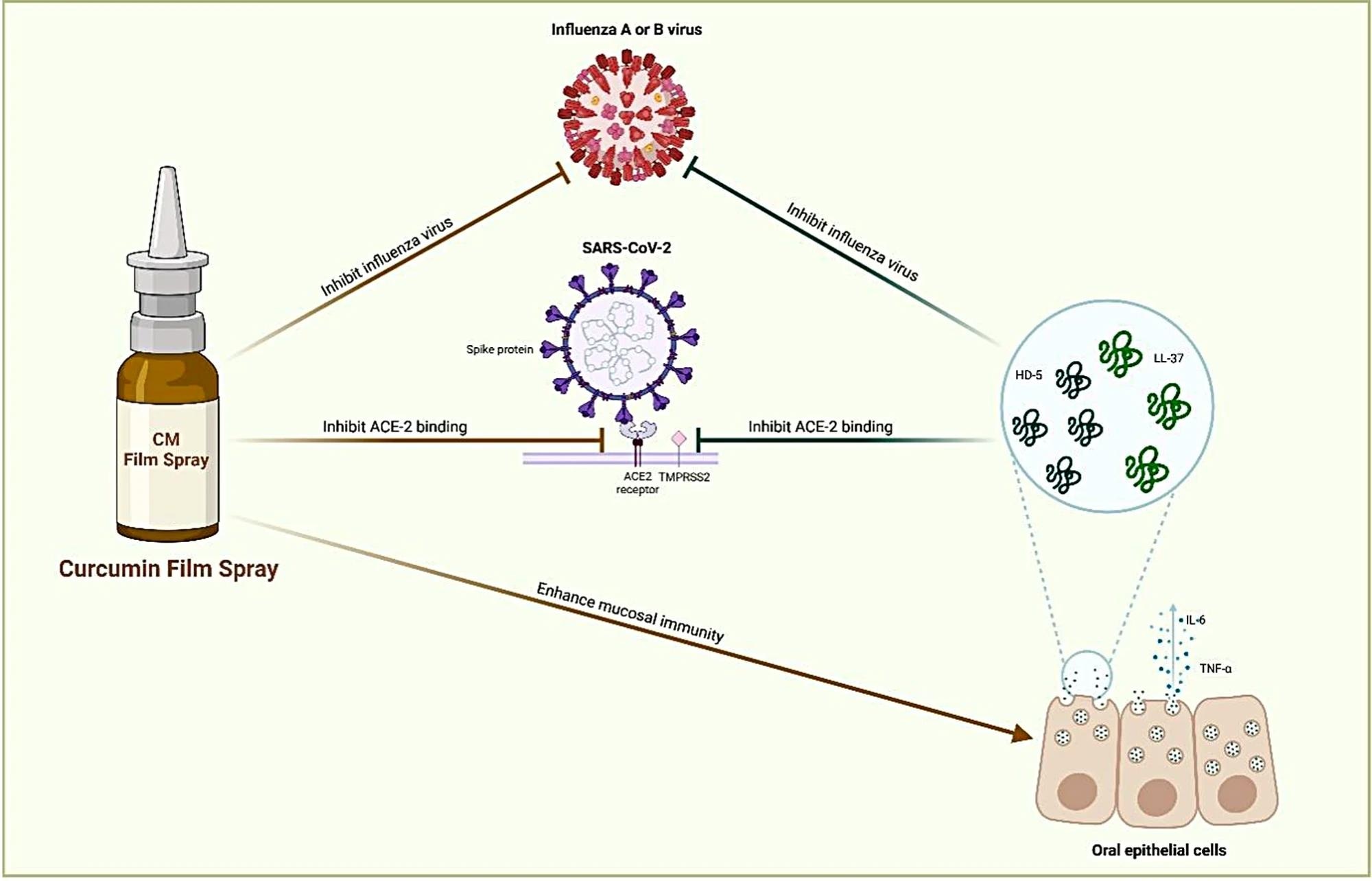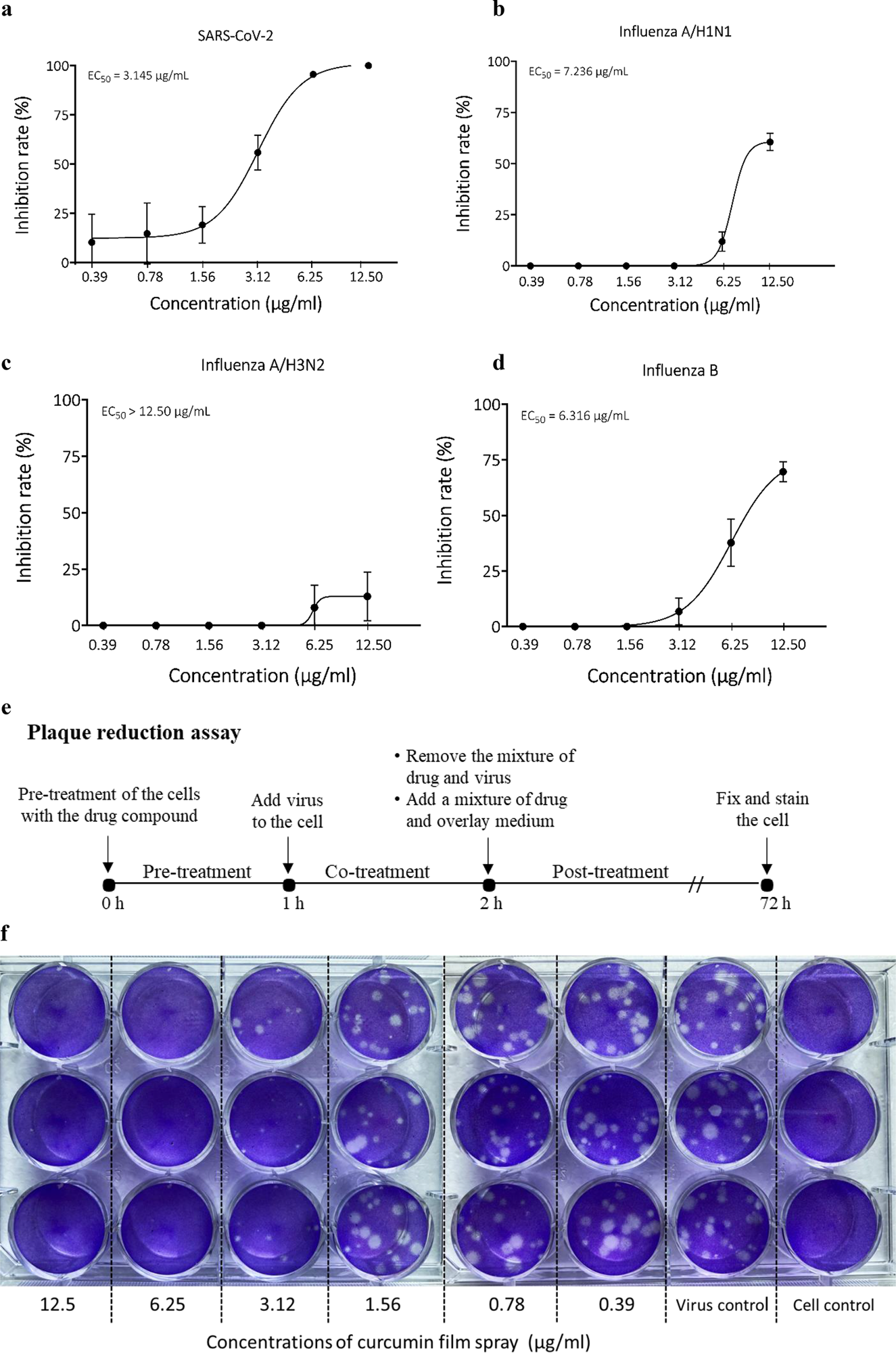A team of scientists from Thailand has developed a curcumin-containing oro-nasal film spray, which shows potential antiviral activity and mucosal immunity-boosting activity against severe acute respiratory syndrome coronavirus 2 (SARS-CoV-2) and influenza viruses.
The study is published in the Virology Journal.
Background
SARS-CoV-2, the causative pathogen of coronavirus disease 2019 (COVID-19) pandemic, is an enveloped RNA virus that primarily causes mild to severe respiratory infections. Influenza virus types A, B, and C are also RNA viruses that cause seasonal respiratory infections commonly known as flu.
Infections caused by SARS-CoV-2 and influenza viruses are associated with high mortality rates. Although both viruses can affect people from all age groups, more deadly infections occur in older people and immunocompromised patients.
Bioactive compounds derived from plants have gained immense attention in the medical community because of their potent antioxidant, anti-inflammatory, anticancer, and antimicrobial activities. Curcumin is a promising plant-derived compound that shows potential antiviral and immunomodulatory activities against SARS-CoV-2 and influenza A virus.
In this study, scientists have developed an oro-nasal film spray containing curcumin and tested its antiviral and mucosal innate immunity-boosting activities against SARS-CoV-2 and influenza viruses.
 Various actions of the curcumin film spray. Formulation of curcumin film spray shows various actions on prevention of COVID-19; First, it can inhibit SARS-CoV-2 infection by inhibiting ACE-2 binding. Second, the film spray upregulates the production of antimicrobial peptides LL-37 and HD-5 produced by oral epithelial cells, which have been previously reported to inhibit SARS-CoV-2 infection in silico. Third, the film spray induced the production of antiinflammatory cytokines IL-6 and TNF-α produced by oral epithelial cells. In addition, the film spray inhibits influenza virus infection.The infographic was designed by BioRender.com (https://app.biorender.com)
Various actions of the curcumin film spray. Formulation of curcumin film spray shows various actions on prevention of COVID-19; First, it can inhibit SARS-CoV-2 infection by inhibiting ACE-2 binding. Second, the film spray upregulates the production of antimicrobial peptides LL-37 and HD-5 produced by oral epithelial cells, which have been previously reported to inhibit SARS-CoV-2 infection in silico. Third, the film spray induced the production of antiinflammatory cytokines IL-6 and TNF-α produced by oral epithelial cells. In addition, the film spray inhibits influenza virus infection.The infographic was designed by BioRender.com (https://app.biorender.com)
Study design
The antiviral activity of oro-nasal film spray containing 10 µg/ml of curcumin was tested against SARS-CoV-2, influenza A/H1N1, influenza A/H3N2, and influenza B by plaque reduction assay. Different cytotoxicity assays were conducted to determine the viability of oral keratinocytes, nasal epithelial cells, and other tested cell lines in response to the film spray.
Enzyme-linked Immunosorbent assay (ELISA) was conducted to determine the levels of oral and nasal innate immune markers (LL-37, HD-5, and human β defensin 2) in response to the film spray. Moreover, the levels of pro-inflammatory markers (interleukins, tumor necrosis factor, and interferon) were also determined.

Important observations
The fundamental physical properties of the curcumin formulation, including color, pH, droplet size, osmolarity, and viscosity, were tested in the study. The findings showed no alteration in properties after freeze-thawing, indicating the stability of the formulation.
Regarding the cytotoxicity and antiviral activity of curcumin, the study found that the compound is capable of inhibiting viral infection at 6.25 µg/ml concentration by blocking the interaction between SARS-CoV-2 spike protein and human cell membrane receptor angiotensin-converting enzyme 2 (ACE2). At the tested concentration, no cytotoxic effect of curcumin compound was observed.
Similar to the curcumin compound, curcumin-containing film spray showed significant efficacy in inhibiting viral infection at 10 µg/ml concentration without affecting cell viability. The selectivity index of curcumin compound and curcumin-containing film spray was estimated to be 1.23 and 1.68, respectively. The selectivity index defines the window between cytotoxicity and antiviral activity. The higher the index value, the more effective and safer a drug would be during an in vivo treatment for a given viral infection.
Regarding antiviral activities against all tested viruses, the study found that curcumin film spray has the highest inhibitory activity against SARS-CoV-2, followed by influenza B virus and influenza A/H1N1 virus. However, the spray showed only a slight inhibitory activity against influenza A/H3N2 virus.
Effect of curcumin film spray on mucosal innate immunity
The estimation of oral and nasal innate immunity markers revealed that curcumin film spray could significantly induce the secretion of antimicrobial peptides LL-37 and HD-5 and reduce the secretion of hBD-2 protein by oral keratinocytes. However, no upregulated secretion of antimicrobial peptides from nasal epithelial cells was detected in response to the curcumin spray.
Regarding inflammatory cytokines, oral keratinocytes produced an upregulated amount of interleukin 6 and tumor necrosis factor-alpha in response to curcumin film spray. However, nasal epithelial cells did not experience such an effect.
Study significance
The study describes the antiviral and immunomodulatory activities of a novel curcumin-containing oro-nasal film spray. The spray exhibits significant inhibitory activity against SARS-CoV-2 and influenza viruses without inducing cytotoxicity at therapeutic doses. The spray is also capable of inducing the secretion of antimicrobial peptides and anti-inflammatory mediators by oral keratinocytes.
Overall, the study indicates that this curcumin film spray may be effectively used to block viral entry into host cells, prevent lung injury, and reduce disease severity.
- Nittayananta W. 2024. A novel film spray containing curcumin inhibits SARS-CoV-2 and influenza virus infection and enhances mucosal immunity. Virology Journal. https://virologyj.biomedcentral.com/articles/10.1186/s12985-023-02282-x
News
Team finds flawed data in recent study relevant to coronavirus antiviral development
The COVID pandemic illustrated how urgently we need antiviral medications capable of treating coronavirus infections. To aid this effort, researchers quickly homed in on part of SARS-CoV-2's molecular structure known as the NiRAN domain—an [...]
Drug-Coated Neural Implants Reduce Immune Rejection
Summary: A new study shows that coating neural prosthetic implants with the anti-inflammatory drug dexamethasone helps reduce the body’s immune response and scar tissue formation. This strategy enhances the long-term performance and stability of electrodes [...]
Scientists discover cancer-fighting bacteria that ‘soak up’ forever chemicals in the body
A family of healthy bacteria may help 'soak up' toxic forever chemicals in the body, warding off their cancerous effects. Forever chemicals, also known as PFAS (per- and polyfluoroalkyl substances), are toxic chemicals that [...]
Johns Hopkins Researchers Uncover a New Way To Kill Cancer Cells
A new study reveals that blocking ribosomal RNA production rewires cancer cell behavior and could help treat genetically unstable tumors. Researchers at the Johns Hopkins Kimmel Cancer Center and the Department of Radiation Oncology and Molecular [...]
AI matches doctors in mapping lung tumors for radiation therapy
In radiation therapy, precision can save lives. Oncologists must carefully map the size and location of a tumor before delivering high-dose radiation to destroy cancer cells while sparing healthy tissue. But this process, called [...]
Scientists Finally “See” Key Protein That Controls Inflammation
Researchers used advanced microscopy to uncover important protein structures. For the first time, two important protein structures in the human body are being visualized, thanks in part to cutting-edge technology at the University of [...]
AI tool detects 9 types of dementia from a single brain scan
Mayo Clinic researchers have developed a new artificial intelligence (AI) tool that helps clinicians identify brain activity patterns linked to nine types of dementia, including Alzheimer's disease, using a single, widely available scan—a transformative [...]
Is plastic packaging putting more than just food on your plate?
New research reveals that common food packaging and utensils can shed microscopic plastics into our food, prompting urgent calls for stricter testing and updated regulations to protect public health. Beyond microplastics: The analysis intentionally [...]
Aging Spreads Through the Bloodstream
Summary: New research reveals that aging isn’t just a local cellular process—it can spread throughout the body via the bloodstream. A redox-sensitive protein called ReHMGB1, secreted by senescent cells, was found to trigger aging features [...]
AI and nanomedicine find rare biomarkers for prostrate cancer and atherosclerosis
Imagine a stadium packed with 75,000 fans, all wearing green and white jerseys—except one person in a solid green shirt. Finding that person would be tough. That's how hard it is for scientists to [...]
Are Pesticides Breeding the Next Pandemic? Experts Warn of Fungal Superbugs
Fungicides used in agriculture have been linked to an increase in resistance to antifungal drugs in both humans and animals. Fungal infections are on the rise, and two UC Davis infectious disease experts, Dr. George Thompson [...]
Scientists Crack the 500-Million-Year-Old Code That Controls Your Immune System
A collaborative team from Penn Medicine and Penn Engineering has uncovered the mathematical principles behind a 500-million-year-old protein network that determines whether foreign materials are recognized as friend or foe. How does your body [...]
Team discovers how tiny parts of cells stay organized, new insights for blocking cancer growth
A team of international researchers led by scientists at City of Hope provides the most thorough account yet of an elusive target for cancer treatment. Published in Science Advances, the study suggests a complex signaling [...]
Nanomaterials in Ophthalmology: A Review
Eye diseases are becoming more common. In 2020, over 250 million people had mild vision problems, and 295 million experienced moderate to severe ocular conditions. In response, researchers are turning to nanotechnology and nanomaterials—tools that are transforming [...]
Natural Plant Extract Removes up to 90% of Microplastics From Water
Researchers found that natural polymers derived from okra and fenugreek are highly effective at removing microplastics from water. The same sticky substances that make okra slimy and give fenugreek its gel-like texture could help [...]
Instant coffee may damage your eyes, genetic study finds
A new genetic study shows that just one extra cup of instant coffee a day could significantly increase your risk of developing dry AMD, shedding fresh light on how our daily beverage choices may [...]





















